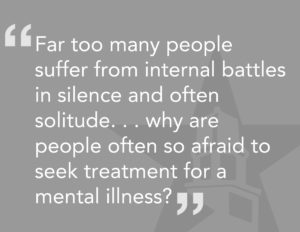Just a couple weeks ago, a boy from my home state committed suicide. He was encouraged to seek counseling as a result of previous instances of self-injury, but was convinced that therapy was only for the weak. This lie had rooted deeply within him, and he suffered alone until ultimately choosing to end his life. My heart broke when I heard this news, and it further convinced me of a belief I have come to hold strongly: each and every human being must be willing to participate in the fight to break down the stigma around mental illness. We must face the complexity and pain of this issue with open minds and compassion, and starting a conversation is the first step.
 Far too many people suffer from internal battles in silence and solitude. When someone has a broken bone or an issue with their blood pressure, they see a doctor in a certain specialty and are considered unwise if they do not accept the treatment offered them. Sometimes, that treatment is in the form of physical therapy, medication, or even just the advice that they take time off and rest.
Far too many people suffer from internal battles in silence and solitude. When someone has a broken bone or an issue with their blood pressure, they see a doctor in a certain specialty and are considered unwise if they do not accept the treatment offered them. Sometimes, that treatment is in the form of physical therapy, medication, or even just the advice that they take time off and rest.
Since we are quick to encourage people to get professional help for physical health needs, why are people often so afraid to seek treatment for the difficulties they face as a result of a mental illness?The answer is a frustrating and complicated one, but at its core it comes down to fear. We assume that we will be perceived as weak for seeking therapy, taking antidepressants, or taking anxiety medications. It’s almost unheard of for someone to take a day off from work or school for mental health. If someone does need to do so, they may find it easier to make up another explanation that they believe will be viewed as more valid. I have personally heard accounts of people doing this, and I know it is more commonly done than most people realize.
Why are we so afraid to admit that our bodies, specifically our minds, need care? All of us have responsibilities that demand our attention and require a certain level of mental function. For those like the nineteen year old boy mentioned above, attempting to function at this level without any outside support or professional help may seem impossible. He had a job, schoolwork, and a family. He was an active student, and presumably had plans for this future. He had things to do, and undoubtedly plenty of pressure to perform well–but he was hurting. He faced difficulties that pained him to a point nobody suspected, and because stigma prevented him from starting a conversation and reaching out for help, his distress went unnoticed until it was too late. This is heartbreaking not only because a young life was lost but also because this life was lost to a treatable illness. This is the truth for many suicide victims who are unable to see that there is always the potential for light to be brought even into the darkest situation.
 For the sake of those whose lives are at stake, don’t be afraid to talk about the things that make you uncomfortable. If you have a friend who battles depression, talk to them about it. You don’t need to pry into the most personal details of their struggle in order to be a loving friend. Telling them that you are a willing ear and that you care for them may provide relief beyond what you could imagine. On the other hand, if you personally struggle with an “invisible” issue, don’t be afraid to confide in a close friend, walk into a counseling office, or speak to a doctor. There is no such thing as an invalid struggle that is unworthy of being addressed. You deserve to show yourself some love.
For the sake of those whose lives are at stake, don’t be afraid to talk about the things that make you uncomfortable. If you have a friend who battles depression, talk to them about it. You don’t need to pry into the most personal details of their struggle in order to be a loving friend. Telling them that you are a willing ear and that you care for them may provide relief beyond what you could imagine. On the other hand, if you personally struggle with an “invisible” issue, don’t be afraid to confide in a close friend, walk into a counseling office, or speak to a doctor. There is no such thing as an invalid struggle that is unworthy of being addressed. You deserve to show yourself some love.
The hardest lies to silence are the ones telling you that it’s not okay to open your mouth, and that it’s unacceptable to seek the care you need. Don’t let those lies have any hold on your life.
Let’s commit to making love louder than the stigma around mental illness, and let’s promise to walk alongside our brothers and sisters who struggle with things we may not understand. To quote my wise and tender-hearted mother, who has worked as a grief counselor for many years, “seeking help is not a sign of weakness, but of great strength.”
Angela is a first-year student majoring in writing and psychology.

Angela, I’m so proud of you <3 Be strong my sister!
—break down the stigma around mental illness
Or, educate those who -s a y- there is one. Educate them, rather than they you.
Your choice.